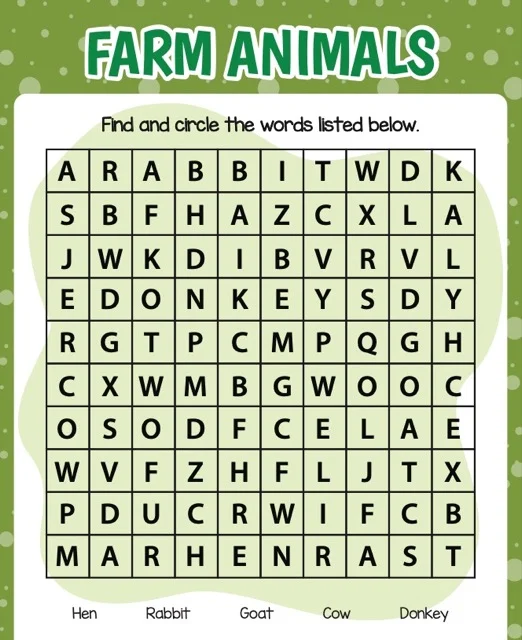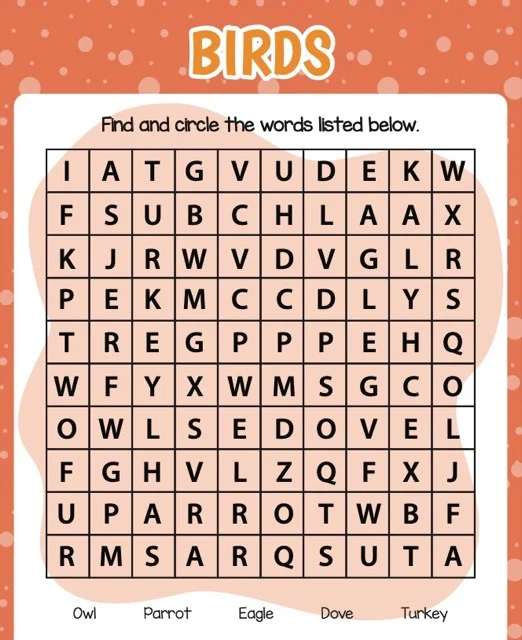The Complete Guide to Word Search Puzzles
This document synthesizes information from three sources to provide a comprehensive guide to word search puzzles. It details the mechanics of word searches, including their structure and how to play effectively. The guide also explores the numerous benefits, ranging from cognitive improvements to entertainment value. Various themes, formats, and accessibility options are discussed, highlighting the puzzle's broad appeal. Finally, strategies for successful word search completion are offered, making it a useful resource for players of all skill levels.
Word Search Puzzles: A Comprehensive Guide
Word Search Briefing Doc: A Comprehensive Overview
This document summarizes key information extracted from three sources: "Testing Theme: Word Search.pdf," "The Word Search Handbook," and "Word Search Puzzles: A Comprehensive Guide." These sources offer a comprehensive exploration of word search puzzles, examining their structure, benefits, variations, and applications.
I. What is a Word Search?
●
A word search is a puzzle consisting of a grid of letters with hidden words arranged horizontally, vertically, diagonally, forward, or backward.
●
The goal is to locate all the words listed in a separate word list by circling or highlighting them within the grid. ("The Word Search Handbook")
●
This simple concept offers a variety of benefits, making it suitable for a wide range of users.
II. Benefits of Word Searches
Word searches offer numerous cognitive and entertainment benefits, making them popular across age groups.
●
Cognitive Benefits:
○
Vocabulary improvement: Exposure to new words and reinforcement of spelling. ("The Word Search Handbook")
○
Enhanced cognitive skills: Improved concentration, focus, and visual scanning abilities. ("The Word Search Handbook," "Word Search Puzzles: A Comprehensive Guide")
○
Problem-solving practice: Exercising problem-solving muscles by locating hidden words. ("The Word Search Handbook," "Word Search Puzzles: A Comprehensive Guide")
●
Other Benefits:
○
Relaxation and entertainment: Serving as a relaxing and enjoyable pastime. ("The Word Search Handbook")
○
Versatility as an educational tool: Applicable across different subject areas and age groups. ("Word Search Puzzles: A Comprehensive Guide")
○
Potential therapeutic applications: May benefit individuals with cognitive impairments. ("Word Search Puzzles: A Comprehensive Guide")
III. Themes and Variations
Word searches cater to diverse interests through various themes.
●
Popular themes include:
○
Animals
○
Food
○
Sports
○
Holidays
○
Travel ("The Word Search Handbook," "Testing Theme: Word Search.pdf")
●
Accessibility and format:
○
Available in various difficulty levels, suitable for both children and adults. ("The Word Search Handbook," "Word Search Puzzles: A Comprehensive Guide")
○
Found in books, newspapers, magazines, online platforms, and mobile apps. ("The Word Search Handbook," "Word Search Puzzles: A Comprehensive Guide")
○
Customizable through online tools and software, allowing for personalized themes and word lists. ("The Word Search Handbook," "Word Search Puzzles: A Comprehensive Guide")
IV. How to Play
Playing a word search involves a systematic approach:
1.
Review the word list: Familiarize yourself with the words you need to find.
2.
Scan the grid: Systematically search horizontally, vertically, and diagonally for the first letter of a word.
3.
Follow the letters: Once the first letter is located, check if the rest of the word follows in a straight line.
4.
Mark the word: Circle or highlight the complete word if found.
5.
Repeat: Continue searching for all remaining words on the list. ("The Word Search Handbook," "Word Search Puzzles: A Comprehensive Guide")
V. Tips for Success
Employ these strategies for effective word search solving:
●
Start simple: Begin with short or easily recognizable words.
●
Scan systematically: Employ a methodical approach, like going row by row or column by column.
●
Spot patterns: Look for repeated letters or unusual letter combinations.
●
Persistence is key: Don't give up easily; keep searching even if a word isn't immediately apparent. ("The Word Search Handbook," "Word Search Puzzles: A Comprehensive Guide")
VI. Conclusion
Word searches provide a fun and engaging way to improve cognitive skills, expand vocabulary, and enjoy a relaxing pastime. Their versatility across themes, formats, and difficulty levels makes them accessible and appealing to a wide audience. Whether utilized for educational purposes, cognitive therapy, or simply for entertainment, word searches offer a valuable and enriching experience.
The Word Search Handbook
Word Search FAQ
1. What is a word search?
A word search is a puzzle that consists of a grid of letters where words are hidden horizontally, vertically, diagonally, forward, or backward. The goal is to find all the words listed in the puzzle by circling or highlighting them.
2. What are the benefits of doing word searches?
Word searches offer various benefits:
●
Vocabulary Improvement: They expose players to new words and help reinforce spelling.
●
Cognitive Skills Enhancement: They enhance concentration, focus, and visual scanning abilities.
●
Problem-Solving Practice: Finding hidden words exercises problem-solving muscles.
●
Relaxation and Entertainment: Word searches can be a relaxing and enjoyable pastime.
3. What themes are common in word searches?
Word searches come in diverse themes, catering to various interests. Some popular themes include:
●
Animals: Lions, tigers, bears, and more!
●
Food: From pizza to sushi, there's a word search for every taste bud.
●
Sports: Find your favorite games like cricket, football, and badminton.
●
Holidays: Celebrate Christmas, Halloween, or Easter with themed puzzles.
●
Travel: Explore countries, cities, and landmarks.
4. How do I play a word search?
1.
Look at the list of words provided below the grid.
2.
Scan the grid horizontally, vertically, and diagonally for the first letter of a word on the list.
3.
Once you find the first letter, see if the rest of the word follows in a straight line.
4.
Circle or highlight the word if you find it.
5.
Repeat the process for all the words on the list.
5. What are some tips for solving word searches?
●
Start with easy words: Look for short words or words with distinctive letters.
●
Scan systematically: Scan the grid in a methodical way, such as row by row or column by column.
●
Look for letter patterns: Pay attention to repeated letters or unusual letter combinations.
●
Don't give up easily: Keep searching even if you don't find a word right away.
6. Are word searches suitable for all ages?
Yes, word searches are enjoyed by people of all ages. Simple puzzles with large print and common words are perfect for young children, while more complex puzzles with challenging vocabulary can entertain adults.
7. Can I create my own word search puzzles?
Absolutely! Several websites and software programs allow you to create custom word searches using your chosen themes and word lists.
8. Where can I find word search puzzles?
Word searches are widely available:
●
Books: Numerous word search puzzle books cater to various themes and difficulty levels.
●
Newspapers and magazines: Many publications feature word searches as part of their entertainment sections.
●
Online: Countless websites offer free and printable word search puzzles.
●
Mobile apps: Various word search apps provide a digital experience with features like hints and progress tracking.
Word Search Puzzles: A Comprehensive Guide
Word Search Exploration
Short Answer Quiz
Instructions: Answer the following questions in 2-3 sentences each.
1.
What are the two main components of a word search puzzle?
2.
Describe three cognitive benefits of solving word searches.
3.
List four common themes used in word search puzzles.
4.
Explain the basic steps on how to play a word search.
5.
Provide two tips for effectively solving word search puzzles.
6.
Why are word searches considered suitable for people of all ages?
7.
What options are available for creating personalized word searches?
8.
Where can you find word search puzzles besides books and online resources?
9.
What is the primary goal of a word search puzzle?
10.
How can word searches contribute to vocabulary development?
Answer Key
1.
A word search puzzle consists of a grid of letters containing hidden words and a list of words that need to be found within the grid.
2.
Word searches enhance concentration, focus, and visual scanning skills. They also promote problem-solving by requiring players to locate specific words.
3.
Popular word search themes include animals, food, sports, holidays, and travel.
4.
To play, review the word list, scan the grid for the first letter of a word, follow the letters to see if the word is formed in a straight line, and circle or highlight the word when found. Repeat for all words.
5.
Start by searching for short or easily recognizable words. Scan the grid systematically, row by row or column by column, to avoid missing any words.
6.
Word searches offer adjustable difficulty levels. Simple puzzles with large print and familiar words suit young children, while more challenging vocabulary caters to adults.
7.
You can create custom word searches using websites or software programs that allow you to input your own themes and word lists.
8.
Newspapers and magazines often feature word search puzzles in their entertainment sections.
9.
The primary goal is to find all the words listed below the grid by identifying them within the jumbled arrangement of letters.
10.
Word searches expose players to new words and reinforce correct spelling by requiring them to visually identify and locate the words within the grid.
Essay Questions
1.
Analyze the impact of word searches on cognitive development, specifically addressing the skills they enhance and how these skills can benefit individuals in various aspects of their lives.
2.
Discuss the versatility of word searches as an educational tool, exploring their potential application in different subject areas and age groups.
3.
Compare and contrast the advantages of traditional paper-based word searches with those offered through digital platforms, considering factors such as accessibility, interactivity, and user experience.
4.
Evaluate the effectiveness of word searches as a means of vocabulary acquisition, examining the factors that influence their impact on word learning and retention.
5.
Explore the potential of word searches as a therapeutic tool for individuals with cognitive impairments, discussing the specific benefits they may offer and any limitations to consider.
Glossary of Key Terms
●
Word Search Puzzle: A puzzle consisting of a grid of letters with hidden words that need to be found based on a provided list.
●
Grid: The arrangement of letters in rows and columns that form the word search puzzle.
●
Word List: A list of words that are hidden within the word search grid.
●
Themes: Specific topics or categories used to organize the words in a word search puzzle, such as animals, food, or holidays.
●
Cognitive Skills: Mental processes involved in thinking, learning, and problem-solving, such as concentration, focus, and memory.
●
Vocabulary: The collection of words a person understands and can use.
●
Visual Scanning: The ability to quickly and accurately search for specific visual information.
●
Problem-solving: The process of finding solutions to challenges or obstacles.
●
Digital Platform: An online or electronic medium for accessing and interacting with content, such as websites and mobile apps.
●
Therapeutic Tool: A method or activity used to improve mental, emotional, or physical well-being.























